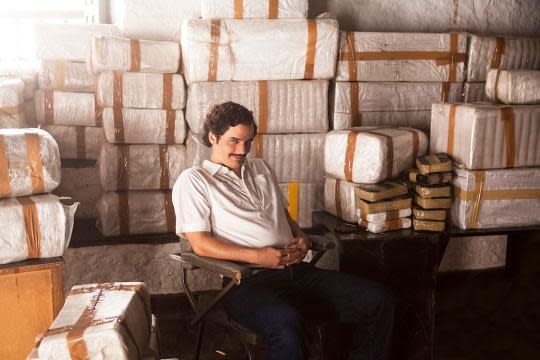'Narcos': Starsky and Hutch Chase Scarface in Netflix's New Series

Loaded with guns, drugs, sex, and political intrigue spread over 10 episodes, Narcos has all the range and subject matter of a great TV epic. It never quite achieves that status — but the series, which begins streaming on Netflix on Friday, certainly tries hard and admirably.
If you have even a passing knowledge of the rise of South American cocaine king Pablo Escobar, you won’t hear much that’s new in the opening hour of the show. It’s there to introduce the main characters, who, in addition to Escobar — played with a fine subtlety and a pot belly by Wagner Moura — include two real-life-based Drug Enforcement Agents, Steven Murphy (the gravelly voiced Boyd Holbrook) and Javier Peña (portrayed by Pedro Pascal, aka Oberyn Martell from Game of Thrones).
Once the introductions are made — and once you get used to the regular yet unpredictable use of voiceover narration by Murphy — Narcos’s addictiveness begins to kick in.
Show creators Chris Brancato, Eric Newman, and Carlo Bernard want to tell two parallel tales: the DEA investigation and hunt for Escobar, and Escobar’s point of view in his ever-increasing ambition, power, and ruthlessness.
Narcos is superb at delineating the latter: You really get an understanding of how a poor, not especially charismatic man rose from the rabble to become one of the richest, most feared men in the world. This is the show’s best use of its length and scope — Narcos details Escobar’s education in the growth and distribution of cocaine, and his care in surrounding himself with loyal help in a country where poverty makes so many desperate and unreliable. Indeed, as in the stories of all prominent men and women in history, there is an element of Escobar’s character, no matter how deadly and immoral he was, that demands admiration for his foresight and discipline.
In contrast to this, the efforts of Murphy and Peña to defeat Escobar are, of necessity, more hit-or-miss. Squeezed between obeying their governmental masters and trying to keep pace with the flood of Escobar’s Medellin cartel cocaine, the duo is constantly scrambling, always playing catch-up, with occasional small victories the only make them desperate to acquire the biggest prize. The result is a show that often plays like Starsky and Hutch Chase Scarface.
The voiceover narration is one of the weakest aspects of Narcos; it’s often riddled with clichés and variations on hardboiled lines we’ve heard before. “Sometimes you gotta do bad things to catch bad people,” Murphy growls on the soundtrack. Escobar is “the man who would change my life forever.” Murphy grouses that he and his partner’s “hands [are] tied by bureaucracy.” Few observations in voiceover are not obvious as visuals on the screen. Indeed, I began to realize that, were it not for the regular intrusions of Murphy’s voiceover, I wouldn’t even be thinking of him as Narcos’s most central character — Peña is actually the more compelling DEA agent, and a series narrated by Escobar might have been truly revolutionary.
But as it is, Narcos remains compelling; whether you get hooked on it depends on your appetite for many different-but-similar scenes of Escobar assassinating one public figure after another who threatens his crime kingdom, and one trap after another set for the villain by the DEA. The international cast is a large and mostly excellent one, including Luis Guzman as the sadistic bad-guy Jose Gacha. The large amount of Spanish-language dialogue is subtitled and only adds to the documentary feel the filmmakers are going for. The message conveyed by Narcos is clear: The war on drugs instituted by the Reagan administration in the ‘80s (Reagan is seen in film footage periodically) was a botched folly, and its failure reverberates down into the present day.
Narcos begins streaming Friday, Aug. 28 on Netflix.


